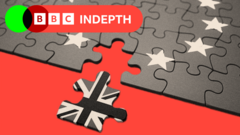Portugal's snap election has concluded with the center-right Democratic Alliance led by Prime Minister Luís Montenegro securing a win, but without a parliamentary majority. The results show a notable rise in support for the hard-right Chega party, challenging traditional political dynamics. Political analysts highlight Chega's transformation from a protest faction to a formidable contender, fueled by growing anti-immigration sentiment and economic discontent. This election marks a pivotal moment for Portugal, shaking the political landscape that, until recently, had largely excluded the hard right.
Portugal's Center-Right Coalition Wins Snap Election Amid Chega's Surge

Portugal's Center-Right Coalition Wins Snap Election Amid Chega's Surge
Despite winning the election, Prime Minister Luís Montenegro's center-right coalition struggles for a majority as the hard-right Chega party emerges as a significant political force.
Montenegro's coalition received around 32% of the votes while facing stiff competition from the Socialist Party, which garnered approximately 23%, and Chega, closely following at around 22%. With a minority government on the horizon and the coalition refraining from forming alliances with Chega, experts anticipate ongoing instability. The recent election was called after a no-confidence vote ousted Montenegro's previous government, a tenure marred by controversy and inadequate representation in Parliament. Chega's rise, previously absent from Portugal's political scene since the end of Salazar's dictatorship, indicates a significant shift as it promises tougher stances on immigration and security measures, resonating with a disenchanted electorate.




















